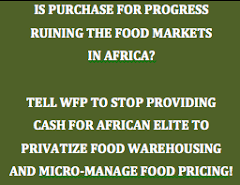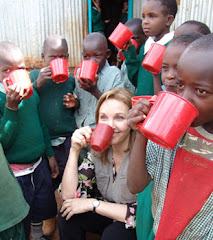The U.S. is interested in potentially using more locally-produced food aid rather than U.S. grown food as a way to expand investment in agricultural development in the developing world, said Alonzo Fulgham, acting head USAID, "on the sidelines of a World Food Summit in Rome" on Tuesday, Reuters reports. "The United States is the largest food donor in the world but Washington has been criticized by non-governmental organizations for shipping too much U.S.-grown food to hunger-stricken areas," the news service writes.
According to Fulgham, "Our country is looking at the policy and identifying where we should be buying food locally to increase capacity. … That is all part of our new strategy and the new administration is looking very strongly at it but like all rules ... it has to be negotiated and discussed in Congress."
When discussing the G8’s $22 billion three-year agriculture initiative, "Fulgham reiterated Washington's position that this money would best be channeled through a fund administered by the World Bank, whose head is normally appointed by the United States" (Flynn, 11/17).
At the summit on Monday, the U.N. Food and Agriculture Organization (FAO), the International Fund for Agricultural Development (Ifad) and the World Food Program (WFP) launched "a food-security strategy to help developing nations address food insecurity by investing in agriculture and safety nets, to address hunger exacerbated by the food and financial crises and climate change," BusinessMirrorreports (Abano, 11/17).
According to an FAO statement, "The agencies will address overlaps, find additional synergies … This builds on a portfolio of 400 activities involving collaboration in more than 70 countries. All areas of work are being addressed. In the administrative area, collaboration is aimed at achieving cost reduction, efficiency savings, streamlined business processes and knowledge sharing. Joint tendering and the piloting of a common procurement unit starting in January 2010 are a few examples" (11/16).
Summit Fails To Deal With Large Agri-Business Market Dominance, U.N. Official Says
"In a speech to the summit released on Tuesday before delivery," U.N. Special Rapporteur Olivier De Schutter said delegates had not done enough to address large agri-business corporations' food market dominance, according to a second Reuters article.
De Schutter "said private agri-business corporations operated 'without any sort of control and with often extremely high levels of concentration that represent a serious market failure.'" He noted that the summit declaration is "silent about the right of agricultural workers to a living wage." De Schutter "also said the summit declaration was weak on the production and use of biofuels and on commodity market speculation, despite the impact of both on prices."
At a recent U.N. forum, food and agriculture businesses "said they were already investing millions of dollars in sustainable farm development to secure reliable supplies, cut costs and boost positions on new markets" (Aloisi, 11/17). During his speech, De Schutter noted that failure to address "what he saw as the key factors behind price spikes in 2008" would result in a "new food price crisis," another Reuters articles reports. In an interview, he said, "There are indications already, because oil prices are going up and they are very closely linked to agricultural commodities prices. As soon as a big producer will be in difficulty ... speculation will set in" (Aloisi [2], 11/17).
IPS Examines Farmers' Forum
Though "farmers are not part of the official delegations" at the world food summit, "they came anyhow to express their views, since, they say, it is their communities that are most impacted by the food crisis," Inter Press Service Europe writes in an article examining farmers' perspective on food security.
"Small-scale producers from the Amazonian rainforest, from Africa, the Pacific islands and the Himalayas gathered in Rome for the Peoples' Food Sovereignty Forum (Nov. 13-17), held in parallel to the FAO meetings, to discuss the serious effects of the crisis in their communities." According to the forum organizers, there are more than 1.5 billion small food producers in the world and they "produce more than 75 percent of the world's food needs through peasant agriculture and small scale livestock production, and with artisanal fishing" (Zaccaro, 11/18).
News Outlets Examine Summit Outcome
The Financial Times reports: "The latest in a series of fairly fruitless international gatherings ends on Wednesday in Rome, as the United Nations food security summit draws to a halt amid a plethora of platitudes about feeding the poor." According to the newspaper, "The broad approach of the summit is right to recognise that achieving a safe, reliable, affordable supply of food is a multi-faceted project: technology, trade, markets and aid all need to be addressed. But translating this into practical action has proved difficult – not least because agriculture, with its concentrated groups of farmers and agribusinesses and diffuse groups of consumers, has proved peculiarly susceptible to producer group lobbying." The article looks at some of the reasons why it is challenging to address hunger around the world (Beattie, 11/17).
Incidents involving some world leaders "bolstered criticism" that this week's summit "is long on rhetoric and extravagance and short on solutions for the world's 1 billion hungry," the Associated Press reports in an article examining why some view the meeting as a failure. The article discusses the actions of Zimbabwean President Robert Mugabe who has been "blamed for plunging his people into starvation" (David/D’Emilio, 11/17).
At the summit on Tuesday, Mugabe "defended his controversial decade-long land reform program as a matter of 'equity and justice' and blamed the country's dramatic economic collapse in recent years on what he described as 'neocolonialist enemies' in the West who have imposed sanctions," VOA News reports (Zulu, 11/17). Mugabe – who "is banned from visiting the European Union except under special circumstances, such as United Nations conferences" – called for "the West lift the 'illegal and inhuman sanctions' imposed on him and his government," the Telegraph writes (Squires, 11/17).
According to an article in GlobalPost examining Mugabe's appearance at the food summit, "Zimbabweans – black and white alike – see the irony of Mugabe grasping at the chance to attend an international conference where the theme is food security. Mugabe's policies have turned Zimbabwe from a nation with bountiful harvests to a country perennially d








